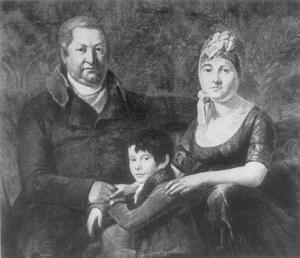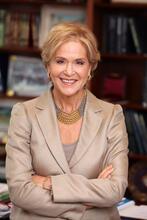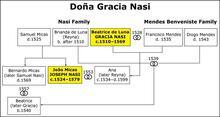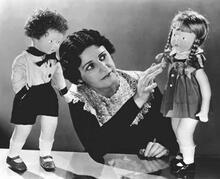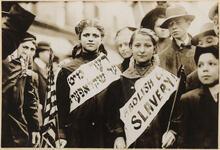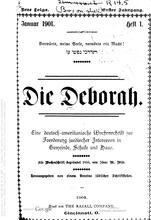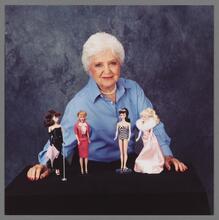Chaile Raphael Kaulla
Born into an affluent family, Chaile Raphael Kaulla took over her family’s bank at age 21 and became court factor in 1768, selling luxury items to nobles and offering them credit. A devout Jew, Kaulla supported both Jewish and Christian poor people, founded a hostel for Jewish travelers, and in 1803 donated a bet midrash, library, and funding for three rabbis to their town of Hechingen. In recognition of her business’ service fighting Napoleon, the Austrian Emperor gave Kaulla the golden chain of honor in 1807 and she and her family were allowed to live in Stuttgart with rights equal to those of Christian citizens.
“Here rests a woman who was outstanding among her people and in her fatherland” is written on the gravestone of “Madame Kaulla” in the Hechingen Jewish cemetery. This refers to her charity as a wealthy and pious Jewish woman and to her significant achievements in serving the Grand Duke (later King) of Wuerttemberg and the imperial army (Reichsarmee). Chaile Raphael Kaulla was the most influential Jewish woman entrepreneur and one of the last Court Jews in eighteenth-century Germany.
Early Life
Chaile, called Karoline in German, was born in 1739 in Buchau, a free imperial town in southwest Germany. Her father, the Parnass Raphael Isaak ben Benjamin, supplied the small courts of the Hohenzollern in Sigmaringen and Hechingen with goods and credit. As a minor court factor, he had his daughter carefully educated, including instruction in German, which was rare at the time. In 1747 the family moved to nearby Hechingen, the small capital of Hohenzollern-Hechingen. In 1757 Raphael married his daughter Chaile to Akiba Auerbach, a horse dealer from Hechingen. Akiba was to devote all his life to Talmudic studies while his wife supported the family as a successful businesswoman. This was a gender arrangement unusual in Germany but more widespread in Eastern Europe. It did not threaten male dominance, which rested on religious privileges and was at the same time seen as an opportunity for the wife to perform a great A biblical or rabbinic commandment; also, a good deed.mitzvah by supporting religious studies.
Because her oldest brother was eleven years younger than herself and Chaile proved to be a gifted young woman, she was introduced to her father’s business and took it over after his death in 1760. At that time, she was twenty-one years old. As early as 1768 she was appointed court factor in the Fürstenberg residence of Donaueschingen, selling horses, silver, jewellery and other expensive goods to this court. In 1770 she became court factor for the Grand Duke of Wuerttemberg in Stuttgart. Having given birth to six children and owning a fast-growing business, Chaile now took in her brother Jakob, born in 1750, as a partner. He soon represented the firm Kaulla & Co in many business negotiations. In contrast to most of the few female Court Jews, Chaile did not start her independent business as a widow, taking over from her husband, but began to build up her own firm as a very young woman.
Career
In the first decades of the firm its main customer was the prince of Hohenzollern in Hechingen with whom the Kaullas developed close ties. Loving horses and hunting, the prince lived far beyond the means of his poor little country and went deeply into debt, with the Kaulla firm as permanent creditor.
The small capital of Hechingen had a relatively large and mostly poor Jewish community of about three hundred. It was headed first by Chaile’s father, then by her brother Jakob, and later by her son Mayer Kaulla. Chaile developed an aristocratic lifestyle, owning an elegant house and a horse-drawn carriage, but she continued to live according to Jewish law. She never forgot the A biblical or rabbinic commandment; also, a good deed.mitzvah and cared for the Jewish community together with her brother, using her connections to the prince. The Kaulla family had their own private synagogue and rabbi. Both sister and brother gave generously to the Jewish as well as to the Christian poor and founded a hostel for needy and migrating Jews in Hechingen. In 1803, they donated a Houses of study (of Torah)bet midrash (bet ha-midrash), a Lit. "teaching," "study," or "learning." A compilation of the commentary and discussions of the amora'im on the Mishnah. When not specified, "Talmud" refers to the Babylonian Talmud.Talmud school, with three rabbinical scholars whom they supported, together with their students and an important library.
The main years of economic success for Madame Kaulla came with the period of the wars against revolutionary France and Napoleon, when armies had to be supplied and war contributions financed. In the 1790s the Kaulla firm gradually took over the supply of rations to the Imperial army (Reichsarmee) throughout South Germany. Millions of guilders were spent on grain or horses for military purposes. The Kaulla firm also handled and credited high amounts of war contributions to be paid by the coalition powers. These services and transactions were highly valued by the rulers. In 1801 Jakob Kaulla, who conducted all the negotiations in Vienna, London and Paris, received the title of Imperial Counselor, while the Austrian Emperor bestowed the golden chain of honor upon Madame Kaulla in 1807.
In this period of war, the Kaulla firm was most useful to Duke Friedrich of Wuerttemberg by supplying credit, army rations and horses and, in addition, handling the ruler’s salt monopoly. In consequence he granted Madame Kaulla, as a Court Jew, the right of residence in his capital, Stuttgart, in 1797. This was an important privilege because Jews—with few exceptions—had not been tolerated in Wuerttemberg since the fifteenth century. However, in 1798 the representatives of Wuerttemberg, a corporate state, forced the duke to revoke this privilege as being contrary to the law. This did not prevent the duke, for the most part financially supported by the Kaulla firm, from founding the Court Bank (Hofbank) of Württemberg in Stuttgart in 1802. Existing for more than a century, the bank was actually the private bank of the Kaullas but handled the state finances.
Later Life
Finally, in 1806, when the new kingdom of Wuerttemberg was completely restructured, Madame Kaulla, her husband and brother and two other members of her family were permitted to reside in Stuttgart and as a special privilege given equal rights with the Christian subjects. In 1807 they left Hechingen to live in the building of the Stuttgart court bank where they again set up a private synagogue. The Kaulla firm increased its investment in the bank, which in 1807 amounted to 1.25 million guilders, a sum not even the Rothschilds could easily have invested at the time. In her late sixties’ Madame Kaulla was at the prime of success.
Chaile Raphael Kaulla died two years later, in 1809, and was buried in Hechingen where her gravestone can still be seen. Her firm and her family, taking on her name Kaulla, continued to flourish in and outside Wuerttemberg. Part of her obituary read as follows, “She was a woman of rare intellectual gifts and of noble character, Court banker at the royal court of Wuerttemberg and head of the banking and commercial firm Kaulla in Stuttgart ... The deceased used a great part of the blessings bestowed upon her by Providence for charity. She was the support of the needy, irrespective of religion, and thousands of tears of the poor here and elsewhere fall on her grave.”
Hebell, Kerstin. “Madame Kaulla und ihr Clan—das Kleinterritorium als individuelle Nische und oekonomisches Sprungbrett.” In Hofjuden—Oekonomie und Interkulturalitaet. Die Juedische Wirtschaftselite im 18. Jahrhundert, edited by Rotraud Ries and J. Friedrich Battenberg, 332–348. Hamburg: 2002.
Katz, Gabriele. Die erste Unternehmerin Süddeutschlands und die reichste Frau ihrer Zeit: Madame Kaulla 1739-1806. Filderstadt: 2006.
Mann, Vivian B. and Richard J. Cohen, eds. From Court Jews to the Rothschilds: Art, Patronage and Power 1600–1800. (exhibition catalog). Munich, New York: 1996, 42–43, 195, 200.
Sauer, Paul. Die juedischen Gemeinden in Württemberg und Hohenzollern. Stuttgart: 1966.
Schnee, Heinrich. Madame Kaulla; Deutschlands bedeutendste Hoffaktorin und ihre Familie. Stuttgart: 1963.
Stern, Selma. The Court Jew. Philadelphia: 1950.

